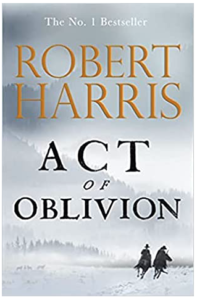
My rating: 3.5 of 5 stars
In “Act of Oblivion,” Robert Harris undertakes an ambitious narrative journey, spanning decades, which is a significant departure from the more concentrated temporal scope of his previous works like “V2” and “Munich.” While this expanded timeline demonstrates Harris’s narrative ambition, it may also dilute the intensity and focus that a more compact format could have offered. Set against the backdrop of the English Civil War and the emerging Republic, the novel holds promise for a deep exploration of an intriguing and underrepresented period in historical fiction. However, despite the rich historical context, the story occasionally feels meandering, leaving the reader to question whether the breadth of the narrative fully capitalizes on the depth of action and detail it presents.
The novel’s core, a personal account from a figure deeply entrenched in the era’s intricate political landscape, brims with untapped potential. This approach piques curiosity but also leaves the reader desiring a more comprehensive examination of the myriad possibilities that the setting offers. Notably, Harris’s exploration of the puritanical ethos that influenced the founding of the American colonies is both engaging and thought-provoking, drawing compelling parallels to contemporary themes and showcasing his exceptional ability to delve into the minds of extremists and the ramifications of such ideologies on everyday lives.
However, it is Harris’s very skill in navigating the psychological landscapes of his characters and the historical milieu they inhabit that suggests a more concise format might have lent the narrative greater sharpness. This is not to propose a reduction in scope, but rather a more concentrated, potent storytelling mode that could have heightened the novel’s impact and brought its insights and revelations into sharper relief.
Despite these considerations, “Act of Oblivion” remains undeniably engaging. Harris’s storytelling prowess is undeniable, as he deftly weaves complex narratives that are both intellectually stimulating and deeply human. His exploration of a period rife with moral complexity and revolutionary fervor adds a valuable dimension to our understanding of history, reminding us of the past’s enduring relevance to our present. Throughout the novel, Harris reaffirms his status as a master storyteller, captivating his audience with his impressive narrative skill. “Act of Oblivion” stands as a testament to the enduring power of historical fiction to illuminate the shadows of the past, even if a more focused approach might have allowed it to shine even brighter.
